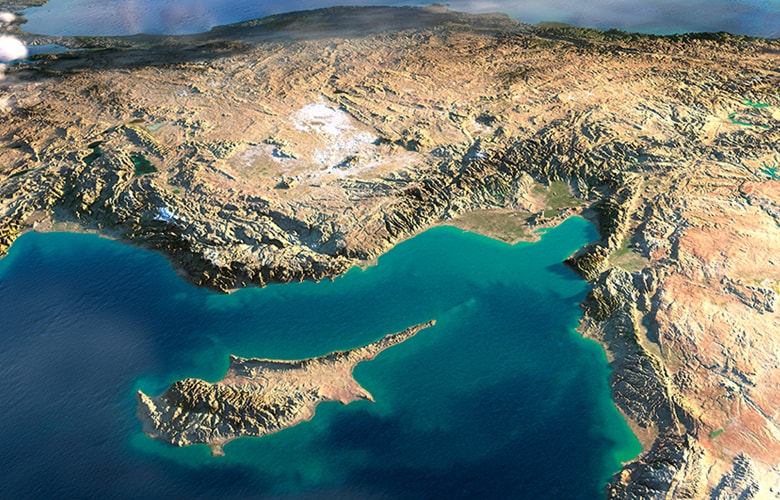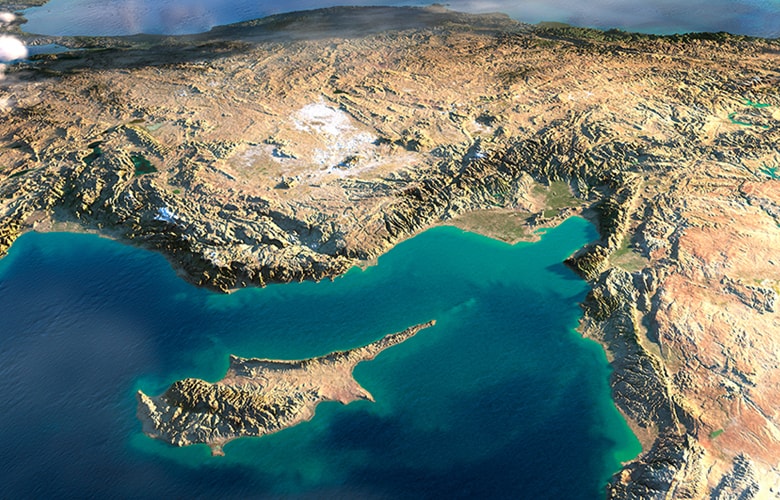
The Diplomatic Observer (July 2019, Issue 137, p.8-12)
Umur Tugay YÜCEL
“Gentlemen, as long as Cyprus is held by the enemy, our supply line will be blocked.Be wary of Cyprus. This island is essential to us.”
Mustafa Kemal ATATÜRK
The struggle began with the discovery of natural gas and oil reserves in the east of the Mediterranean.Both global players and strong actors in the region have rushed into the region.During this process, the significance of Cyprus, which holds strategic importance in the middle of the Eastern Mediterranean, also increased.The island of Cyprus is a natural aircraft carrier in the middle of the Eastern Mediterranean.Its position allows for control over the Middle East and North Africa.This aircraft carrier island also extends control over the southern border of Turkey.The island of Cyprus also holds importance in terms of Turkish presence.The Turkish Republic of Northern Cyprus (TRNC) has great economic, military and strategic potential.From a wider perspective, the Mediterranean is located between Africa, Europe and Asia.This is a region which hosted many important civilizations and empires.The Eastern Mediterranean is a gateway to the Middle East, with all its oil and natural gas reserves, an opening to the Aegean, the Black Sea, the Red Sea and the Atlantic Ocean.About 30 per cent of world trade goes through the Mediterranean.An average of 4,000 cargo ships sails through the Mediterranean every day.Every year, 40,000 Russian trade ships sail through the Turkish Straits to the Mediterranean.
The Eastern Mediterranean and Cyprus maintained their strategic importance through the course of history and nowadays give the impression of an energy base. The first natural gas reserve in the region was found at the Leviathan field in 1999 by Israel. The first extensive study of the region was published by the United States Geological Survey (USGS) in 2010.According to the result of various surveys, about 8 billion barrels of oil reserves werediscovered in the vicinity of Cyprus.10-15 trillion cubic metres of natural gas reserves werealso found in the Eastern Mediterranean. There are also rumours of additional large reserves waiting to be discovered.In international reports it was mentioned that the Eastern Mediterranean holds about 47 per cent of the natural gas reserves of the world.These are the reasons which have led to the energy wars at the Eastern Mediterranean.Unfortunately, the Greek and Greek Cypriot side moved faster in the struggle.Greek Cypriots and Greeks invited important global actors to the region, such as the British, the French, Americans and Italians.In addition, Greek Cypriot Administration of Southern Cyprus (GCASC) signed “EEZ (Exclusive Economic Zone) Delimitation Agreements” with Egypt on February 17th2003, with Lebanon on January 17th 2007 and with Israel on December 17th 2010, sharing out the Eastern Mediterranean with other countries.The EEZ was set up according to the 1982 United Nations Convention on the Law of the Sea.The Exclusive Economic Zone is a concept which gives coastal states sovereign rights over a region extending out to sea up to 200 knots (320 km), both under and above the seabed.
In January 2019, the GCASC, Greece, Italy, Israel, Egypt and Jordan established the Eastern Mediterranean Gas Forum with joint cooperation agreements signed at Cairo, which excluded Turkey and the TRNC. Greek Cypriots formed the USA-EU-UK and Israel-Egypt-Lebanon blocks.In addition, giant energy firms such as Exxon Mobil-Noble of the USA, French Total, Italian Eni, Korean Kogas and Qatar Petroleum were invited to the region.The Greek Cypriot side opened the region to surveys by signing agreements with these energy firms.These agreements were disregarded by both Turkey and the TRNC.However, the countries which own rights over the natural gas and oil to be extracted from these fields are the countries in the region, namely Turkey, the TRNC, Egypt, Lebanon, the GCASC, Syria, Israel and Palestine.Despite this, the GCASC divided the Aphrodite field, which it claims to lie in itsEEZ in the Eastern Mediterranean, into 13 parcels.Afterwards, these fields were put out to international tenders.Against this lawless procedure, the rights of the TRNC were confirmed by the United Nations.Both political equality and equal sovereignty rights were granted.This decision did not just concern sharing rights and necessitates that the processes of resource surveying and developing are carried out jointly.
After the one-sided and unlawful agreements made by the GCASC, Turkey and the TRNC took action.It should be pointed out here that Turkey came very late to the process.Turkey and the TRNC signed a continental shelf delimitation agreement on September 21st2011.The Turkish Petroleum Corporation (TPC) was granted permission to search for oil and natural gas.Since 2011, Turkish seismic survey ship Barbaros Hayrettin Paşa and deepsea drill ship Fatihhave been carrying out surveys within the region.A second drill ship, Yavuz, will join the surveying activities in July.Turkey has become one of the ten countries which possess new generation ships that are able to conduct underground drilling.In response to the GCASC’s unlawful decisions, Turkey sent a letter to the United Nations on March 18th 2019, stating that the Turkish continental shelf borders in the Mediterranean delimit the area between 32°16'18"E and 28° W.In addition, it was expressed that the middle line between Turkey and Egypt’s maritime jurisdiction is the border of Turkey's continental shelf.
For Turkey, which is externally dependent for 99 per cent of its natural gas and 89 per cent of its oil, the Eastern Mediterranean and Cyprus are of vital importance in terms of energy.Turkey needs to ensure the security of its energy supply.In addition, Turkey is the most secure and cheapest route for the transportation of Eastern Mediterranean energy to the European energy market.Along with this, due to Turkey’s increasing energy needs, it is also one of the most promising markets for the Eastern Mediterranean gas.
Energy resources in the Eastern Mediterranean and around Cyprus have drawn global powers and companies to the region.The USA, the United Kingdom, French, Italy, Greece, the GCASC and Israel have started conducting joint military exercises.The European Union in particular has set its sights on the region; in order to reduce its energy dependence and to by-pass Russia.This is because energy is the Europe’s soft spot.The GCASC is a part of the European Union Permanent Structured Cooperation (PESCO).At the 2018 Brussels summit, PESCO countries established military and defence cooperation with each other.Also, American senior officials met with Greek Cypriot counterparts and asked for easy access to air and naval bases.In addition, Israeli ships and Greek Apache helicopters are patrolling the region together.Currently, the European Union supports the Greek Cypriot side openly, while the USA provides support less conspicuously.There have already been face-offs between energy firms’ ships and Turkish naval vessels.It can be said that, currently,the security ofCyprus is guaranteed by the USA, the United Kingdom, France, Italy, Greece and Israel, albeit against the law.The United Kingdom, which has military bases that cover 3 per cent of the island, decided to deploy more than 100 new generation F35 planes at the AkrotiriBase. There are also NATO planes deployed at these bases.These are positioned to be able to strike targets in Syria within 15 minutes and return to base. It is estimated that about 3,000 British troops are deployed in Cyprus. In addition, there are listening stations used by NATO and the USA, which target the Middle East and provide electronic and signal intelligence.The Greek Cypriots are also in military cooperation with the French.France will be able to use air and naval bases and ensure naval security for energy.Greek Cypriot soldiers will be able to receive education at French schools.The island of Cyprus is being rapidly transformed into a centre for US, British and European military bases, due to energy activities.France has sent an aircraft carrier to the region and conducted joint military exercises with Egypt.There are of course, two rising actors that should not be overlooked: Russia and China.
Russia, back in the game with Putin, is increasing its power with each passing day as an important actor in the Mediterranean.In addition, Russia has increased its fleet at the Black Seanorth of the Mediterranean with new generation battleships and submarines.It can be said that Russia is now a maritime power. Russia’s increasing naval exercises and dock visits have completed the picture.Russia has also deployed 10 hi-tech ships in Syria and obtained permissions to use Tartus and Latakia ports for many years to come.These ports, which will harbour many ships, will also be able to service nuclear-powered ships. Ballistic missiles of the Russian Mediterranean Task Force ships deployed at the Tartus port are able to target all NATO facilities within as far as Italy.Russia now maintains a permanent naval force in the region.In addition, Russia can be considered as a Mediterranean and Middle Eastern country with its important victories over the recent years.Russia has made serious investments, particularly in the GCASC.It has been requesting permanent bases from the Greek Cypriot side.Another important actor, China, has trade bases both in Crete and Greece’s Piraeus port.China and Russia conduct joint naval military exercises in the Mediterranean.
However, it should not be forgotten that at present, the world is going through a period in which“the law of power” is stronger than “the power of the law”.A country can only hope to succeed to the extent that its hand is strong.This is because the USA, the European Union, the United Kingdom and Israel continue their attitude of not recognising Turkey’s and the TRNC’s area of jurisdiction in the Mediterranean and Cyprus.With the “Blue Homeland 2019” naval exercise carried out simultaneously in the Black Sea, the Aegean and the Mediterranean with the participation of 103 ships between February 27th - March 8th 2019, Turkey aimed to show that any undertakings in the region without the consent of Turkey and TRNC will not be allowed to the relevant parties.With this exercise, Turkey displayed its determination to not make even the slightest compromise regarding its “Blue Homeland”, which is defined as the Black Sea, Aegean and Mediterranean. After the Blue Homeland, largest scheduled manoeuvre in the history of the Republic, the Sea Wolf – 2019 was launched in three seas surrounding Anatolia with 131 warships, 57 warplanes and 33 helicopters.Having completed its preliminary manoeuvre trainings at an operative level with the Blue Homeland 2019 Military Exercise, the Turkish Navy then carried out the strategic and operative level Sea Wolf Military Exercise with even larger participation, based on an advanced crisis-tension, war-time scenarios.
What kind of path should Turkey follow for the upcoming energy wars?What kind of strategy benefit Turkey in a field where such global and regional actors take part?First, Turkey needs to establish institutions and organisations which will act jointly with the TRNC.A joint strategy should be followed within a joint structure.Turkey should merge its two large energy companies, TPC and PPC into one, transforming them into a global company.Both its personnel and technical equipment should be improved.This is because this region has enough reserves to meet Turkey’s energy needs for the next 100 to 500 years.In addition, with the discovery of these reserves, it has become certain that Turkey will be a long-term energy corridor and market.For these reasons, long-term national policies should be designed.
In the recent period, there have been attempts todrive Turkey into a corner through economic and armed terrorism.Turkey stands against the US-EU block on many different fronts.This trend remains the same regarding the Eastern Mediterranean and Cyprus.Turkey and the TRNC should create their own block against the USA-UK, France, Italy, Greece, the GCASC, Israel and Egypt block formed against them.But before that, Turkey needs to rank among the important naval forces in the world as a country surrounded on three sides by the sea.Turkey should become a naval power with aircraft carriers and nuclear submarines.Its navy should be modernised as soon as possible.Naval power is a necessity for becoming a global power.Afterwards, Turkey should build permanent air and naval bases in the TRNC. Cooperation with the world’s second largest economic power, China, and one of the world's important military powers, Russia, should be established.Of course, in addition to these two giant countries, cooperation can be established with two other energy importer countries, such as India and Japan.After these countries, as a second stage, a joint energy commission can be established between Azerbaijan, Turkey and the TRNC.Oil and natural gas surveying, production, processing, distribution and storage projects may be conducted with the Azerbaijan’s SOCARcompany.A joint refinery project may be implemented, particularly with the TRNC.Joint storage systems can be built.These investments will create a massive amount of employment.By regionally normalising relations with Syria once more, both the security of Iskenderun Bay can be established and Turkey's area of influence can be expanded.In this regard, Russians also want to secure their Tartus base.Establishing EEZ borders with Lebanon will provide room for manoeuvre for Turkey.In addition, some batteries of the S-400 systems to be purchased from Russia should be deployed in a way which would include the Akkuyu Nuclear Plant, the Eastern Mediterranean and Cyprus in their range.China also has critical importance for the Eastern Mediterranean in terms of its One Belt One Road initiative.Initially, joint survey and energy production agreements should be made with Russia, China, India, Brazil and Japan in the Eastern Mediterranean and Cyprus.In fact, even a project for a joint naval base with Russia-China or Russia-China-India could be brought on the agenda.Joint military exercises should be conducted with Russia-China-India and Brazil.With naval base projects and energy field surveys, fruitful projects for both Turkey and the TRNC can be developed with global actors.A bridge can be constructed which will connect Turkey and the TRNC via land and railways.The TRNC’s infrastructure and development can be restructured.Joint universities based on software and technology researchcould be established.The mentioned countries, with their high populations, hold a great tourist potential both for Turkey and the TRNC.In the future, the support of global actors forthe recognition of the TRNC should be won.Turkey should carry out all these activitieswith a multi-dimensional and balanced approach.
REFERENCES
Atun Ata, the Eastern Mediterranean and Energy Wars, Anka Institute, September - October 2018
Yılmaz Emre, Dead End at the Eastern Mediterranean, SETA, March 2018
Güçyetmez Ferdi, Energy Wars in the Mediterranean DİSAM, May 2019
AlparGüray, Possible Consequences of the Energy Conflict in the Eastern Mediterranean in terms of Security ,SDE, February 2019
Sağsenilhan, A new Crisis and Arena:The Eastern Mediterranean, Anatolian Agency, May 2019
Pamir Necdet, Energy and Geopolitics from the viewpoint of the Eastern Mediterranean and Cyprus, Chamber of Petroleum Engineers, June 2018
Tarakçı Nejat, What should be the Turkey’s Eastern Mediterranean Strategy in consideration of the Balance of Powers? ,TASAM, April 2019
TaşçıoğluÖmerLütfi, The GCASC’s Surveys of Oil and Natural Gas within the Regions Belonging to the Maritime Jurisdiction of the Turkish Republic and the Turkish Republic of Northern Cyprus and Exclusive Economic Zone Agreements, Social Sciences Studies Journal, December 2018
Photo: m5dergi.com
© 2009-2025 Avrasya İncelemeleri Merkezi (AVİM) Tüm Hakları Saklıdır
Henüz Yorum Yapılmamış.
-
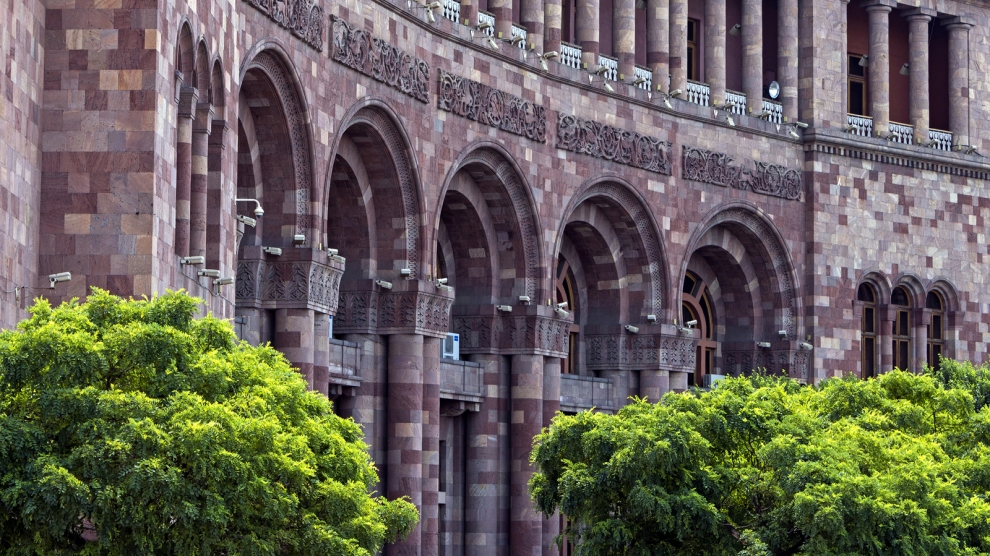 ARMENIA: GETTING MANY THINGS RIGHT –EMERGING EUROPE- 17.03.2018
ARMENIA: GETTING MANY THINGS RIGHT –EMERGING EUROPE- 17.03.2018
Claudia PATRICOLO 19.03.2018 -
BAŞKA BAHARA MI?
Oya EREN 28.02.2010 -
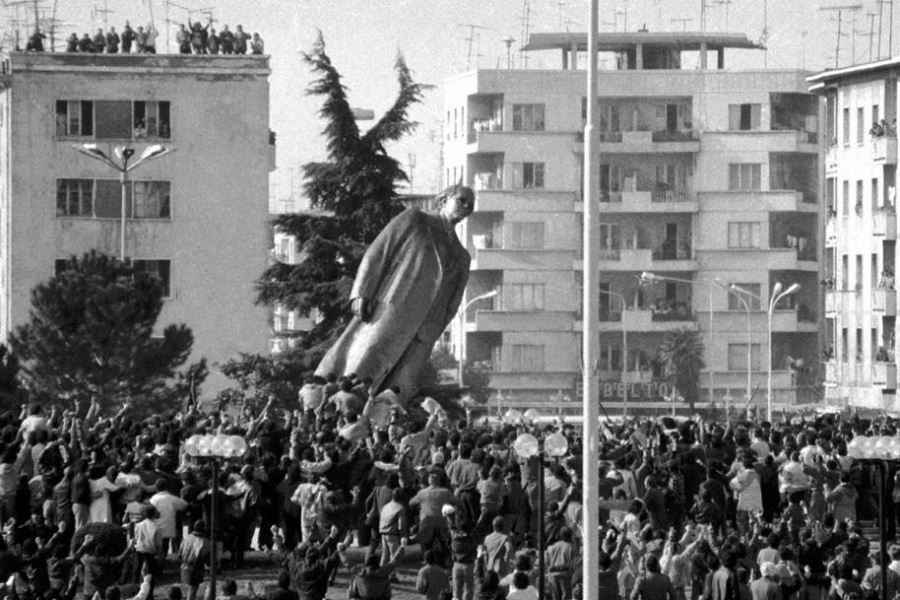 BALKANLAR YENİDEN - YENİ ADANA - 26.10.2021
BALKANLAR YENİDEN - YENİ ADANA - 26.10.2021
Hasan Sevilir AŞAN 08.11.2021 -
HIRVATİSTAN’IN AB ÜYELİĞİNE YEŞİL IŞIK Dr. Erhan TÜRBEDAR
- 28.06.2011 -
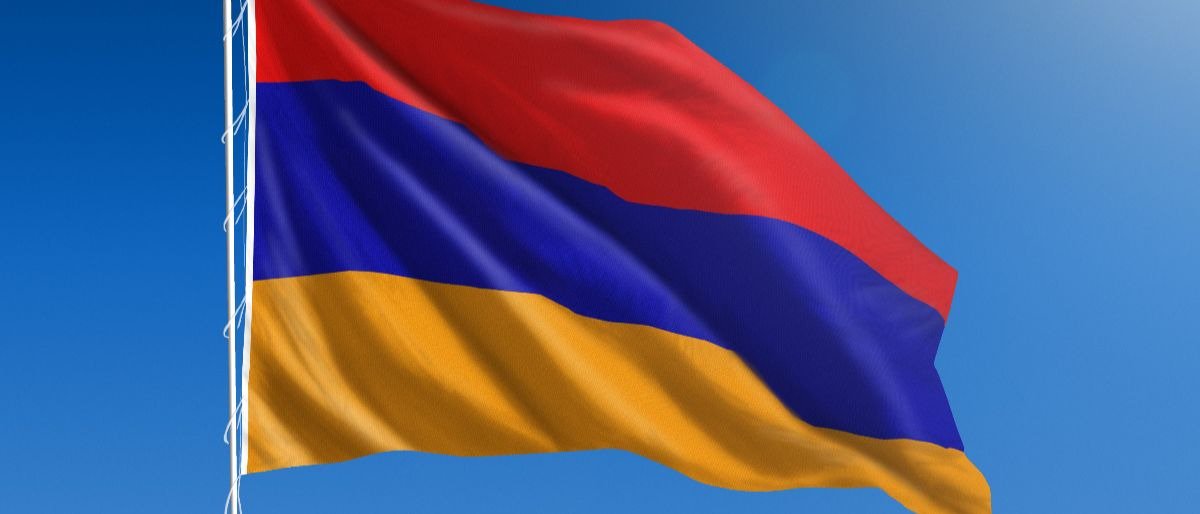 ARMENIAN INFLUENCE PRESENTS A CASE STUDY ON THE FOREIGN AGENTS REGISTRATION ACT - THE DAILY CALLER - 05.02.2018
ARMENIAN INFLUENCE PRESENTS A CASE STUDY ON THE FOREIGN AGENTS REGISTRATION ACT - THE DAILY CALLER - 05.02.2018
Raoul LOWERY-CONTRERAS 08.03.2018


